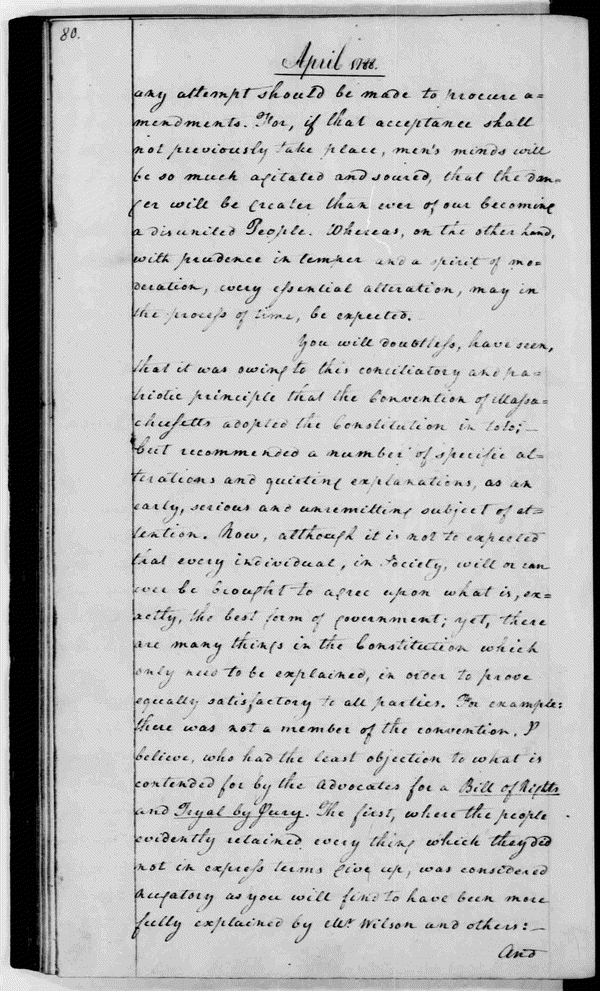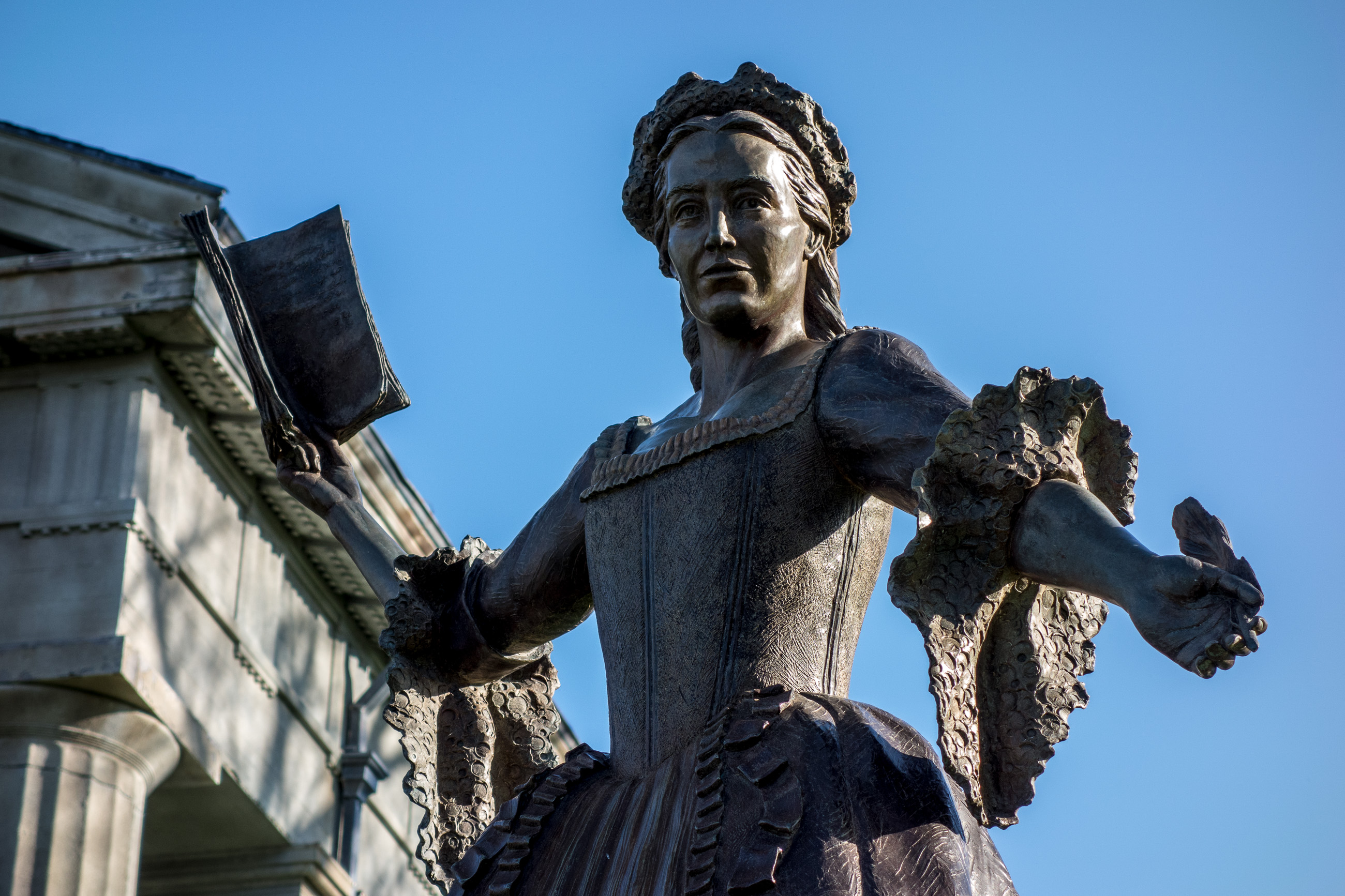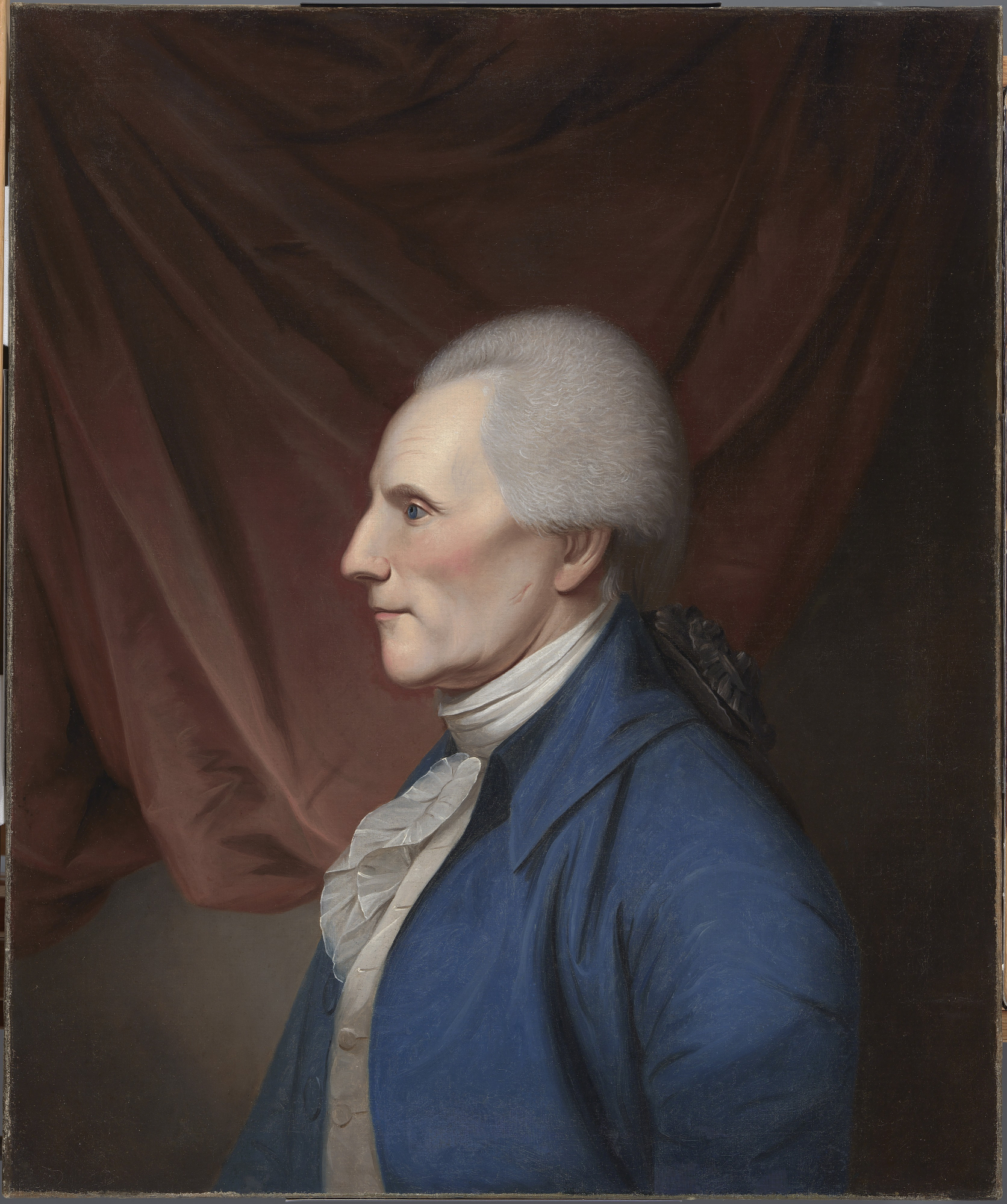|
Anti-Federalists
The Anti-Federalists were a late-18th-century political movement that opposed the creation of a stronger U.S. federal government and which later opposed History of the United States Constitution#1788 ratification, the ratification of the 1787 United States Constitution, Constitution. The previous constitution, called the Articles of Confederation, Articles of Confederation and Perpetual Union, gave State governments of the United States, state governments more authority. Led by Patrick Henry of Virginia, Anti-Federalists worried, among other things, that the position of President of the United States, president, then a novelty, might evolve into a monarchy. Though the Constitution was ratified and supplanted the Articles of Confederation, Anti-Federalist influence helped lead to the enactment of the United States Bill of Rights, Bill of Rights. Nomenclature The name "Anti-Federalists" is a misnomer. It was imposed upon the movement by their opponents, the Federalism in the Unite ... [...More Info...] [...Related Items...] OR: [Wikipedia] [Google] [Baidu] |
United States Bill Of Rights
The United States Bill of Rights comprises the first ten list of amendments to the United States Constitution, amendments to the United States Constitution. It was proposed following the often bitter 1787–88 debate over the Timeline of drafting and ratification of the United States Constitution, ratification of the Constitution and written to address the objections raised by Anti-Federalism, Anti-Federalists. The amendments of the Bill of Rights add to the Constitution specific guarantees of personal freedoms, such as Freedom of speech in the United States, freedom of speech, the Freedom of the press in the United States, right to publish, Freedom of religion in the United States, practice religion, Right to keep and bear arms in the United States, possess firearms, Right to assemble, to assemble, and other natural and legal rights. Its clear limitations on the government's power in judicial and other proceedings include explicit declarations that all powers not specificall ... [...More Info...] [...Related Items...] OR: [Wikipedia] [Google] [Baidu] |
History Of The United States Constitution
The United States Constitution has served as the supreme law of the United States since taking effect in 1789. The document was written at the 1787 Philadelphia Convention and was ratified through a series of state conventions held in 1787 and 1788. Since 1789, the Constitution has been amended twenty-seven times; particularly important amendments include the ten amendments of the United States Bill of Rights and the three Reconstruction Amendments. The Constitution grew out of efforts to reform the Articles of Confederation, an earlier constitution which provided for a loose alliance of states with a weak central government. From May 1787 through September 1787, delegates from twelve of the thirteen states convened in Philadelphia, where they wrote a new constitution. Two alternative plans were developed at the convention. The nationalist majority, soon to be called " Federalists", put forth the Virginia Plan, a consolidated government based on proportional representation amon ... [...More Info...] [...Related Items...] OR: [Wikipedia] [Google] [Baidu] |
Federalism In The United States
In the United States, federalism is the constitutional division of power between U.S. state governments and the federal government of the United States. Since the founding of the country, and particularly with the end of the American Civil War, power shifted away from the states and toward the national government. The progression of federalism includes dual, cooperative, and New Federalism. Early federalism Federalism is a form of political organization that seeks to distinguish states and unites them, assigning different types of decision-making power at different levels to allow a degree of political independence in an overarching structure. Federalism was a political solution to the problems with the Articles of Confederation which gave little practical authority to the confederal government. For example, the Articles allowed the Congress of the Confederation the power to sign treaties and declare war, but it could not raise taxes to pay for an army and all major deci ... [...More Info...] [...Related Items...] OR: [Wikipedia] [Google] [Baidu] |
James Madison
James Madison (June 28, 1836) was an American statesman, diplomat, and Founding Fathers of the United States, Founding Father who served as the fourth president of the United States from 1809 to 1817. Madison was popularly acclaimed as the "James Madison as Father of the Constitution, Father of the Constitution" for his pivotal role in drafting and promoting the Constitution of the United States and the United States Bill of Rights, Bill of Rights. Madison was born into a prominent slave-owning Planter class, planter family in Virginia. In 1774, strongly opposed to British taxation, Madison joined with the Patriot (American Revolution), Patriots. He was a member of the Virginia House of Delegates and the Continental Congress during and after the American Revolutionary War. Dissatisfied with the weak national government established by the Articles of Confederation, he helped organize the Constitutional Convention (United States), Constitutional Convention, which produced a n ... [...More Info...] [...Related Items...] OR: [Wikipedia] [Google] [Baidu] |
Anti-Administration Party
The Anti-Administration party was an informal political faction in the United States led by James Madison and Thomas Jefferson that opposed policies of then Secretary of the Treasury Alexander Hamilton in the first term of U.S. president George Washington. It was not an organized political party, but an unorganized faction. Most members had been Anti-Federalists in 1788, when they opposed ratification of the U.S. Constitution. However, the situation was fluid, with members joining and leaving. Although contemporaries often referred to Hamilton's opponents as "Anti-Federalists", that term is now seen as imprecise since several Anti-Administration leaders supported ratification, including Virginia Representative James Madison. He joined former Anti-Federalists to oppose Hamilton's financial plans in 1790. William Maclay, a leader of the faction in the Senate, used in his Congressional diary the term "Republican". After Jefferson took leadership of the opposition to Hamilton in 1 ... [...More Info...] [...Related Items...] OR: [Wikipedia] [Google] [Baidu] |
United States Constitution
The Constitution of the United States is the Supremacy Clause, supreme law of the United States, United States of America. It superseded the Articles of Confederation, the nation's first constitution, on March 4, 1789. Originally including seven articles, the Constitution delineates the frame of the Federal government of the United States, federal government. The Constitution's first three articles embody the doctrine of the separation of powers, in which the federal government is divided into three branches: the United States Congress, legislative, consisting of the bicameralism, bicameral Congress (Article One of the United States Constitution, Article I); the Federal government of the United States#Executive branch, executive, consisting of the President of the United States, president and subordinate officers (Article Two of the United States Constitution, Article II); and the Federal judiciary of the United States, judicial, consisting of the Supreme Court of the Unit ... [...More Info...] [...Related Items...] OR: [Wikipedia] [Google] [Baidu] |
Articles Of Confederation
The Articles of Confederation, officially the Articles of Confederation and Perpetual Union, was an agreement and early body of law in the Thirteen Colonies, which served as the nation's first Constitution, frame of government during the American Revolution. It was debated by the Second Continental Congress at present-day Independence Hall in Philadelphia between July 1776 and November 1777, was finalized by the Congress on November 15, 1777, and Coming into force, came into force on March 1, 1781, after being ratification, ratified by all 13 colonial states. A central and guiding principle of the Articles was the establishment and preservation of the independence and sovereignty of the original 13 states. The Articles consciously established a weak Confederation, confederal government, affording it only those powers the former colonies recognized as belonging to the The Crown, British Crown and Parliament of Great Britain, Parliament during the Colonial history of the U ... [...More Info...] [...Related Items...] OR: [Wikipedia] [Google] [Baidu] |
Melancton Smith
Melancton Smith (May 7, 1744 – July 29, 1798) was a merchant, lawyer and a New York delegate to the Continental Congress. Praised for his intelligence, liberality, and reasonableness, Smith attained considerable respect in the State of New York by 1787 and he has been described by modern scholars as the most important Anti-Federalist theorist and spokesman. Additionally, Smith played an active and central role in the ratification of the United States Constitution. Biography Melancton Smith was born in Jamaica, Long Island, New York, and was homeschooled by his parents. When his family moved to Poughkeepsie, New York, he became involved in the mercantile business. Smith manifested a life-long interest in metaphysics and religion, and in 1769 he helped organize the Washington Hollow Presbyterian Church and purchased one of its pews. Career in New York He became a delegate to the first New York Provincial Congress in New York on May 22, 1775. He served in the Continent ... [...More Info...] [...Related Items...] OR: [Wikipedia] [Google] [Baidu] |
The Federalist Papers
''The Federalist Papers'' is a collection of 85 articles and essays written by Alexander Hamilton, James Madison, and John Jay under the collective pseudonym "Publius" to promote the ratification of the Constitution of the United States. The collection was commonly known as ''The Federalist'' until the name ''The Federalist Papers'' emerged in the twentieth century. The first seventy-seven of these essays were published serially in the '' Independent Journal'', the ''New York Packet'', and ''The Daily Advertiser'' between October 1787 and April 1788. A compilation of these 77 essays and eight others were published in two volumes as ''The Federalist: A Collection of Essays, Written in Favour of the New Constitution, as Agreed upon by the Federal Convention, September 17, 1787'', by publishing firm J. & A. McLean in March and May 1788. The last eight papers (Nos. 78–85) were republished in the New York newspapers between June 14 and August 16, 1788. The authors of ''The Fed ... [...More Info...] [...Related Items...] OR: [Wikipedia] [Google] [Baidu] |
Mercy Otis Warren
Mercy Otis Warren (September 25, 1728 – October 19, 1814) was an American activist poet, playwright, and pamphleteer during the American Revolution. During the years before the Revolution, she had published poems and plays that attacked royal authority in Massachusetts and urged colonists to resist British infringements on colonial rights and liberties. She was married to James Warren, who was likewise heavily active in the independence movement. During the debate over the United States Constitution in 1788, she issued a pamphlet, ''Observations on the new Constitution, and on the Federal and State Conventions,'' written under the pseudonym "A Columbian Patriot", that opposed ratification of the document and advocated the inclusion of a Bill of Rights. ''Observations'' was long thought to be the work of other writers, most notably Elbridge Gerry. It was not until one of her descendants, Charles Warren, found a reference to it in a 1787 letter to British historian Catharine Ma ... [...More Info...] [...Related Items...] OR: [Wikipedia] [Google] [Baidu] |
Federal Farmer
The Federal Farmer was the pseudonym used by an Anti-Federalist who wrote a methodical assessment of the proposed United States Constitution that was among the more important documents of the History of the United States Constitution#Ratification of the Constitution, ratification debate. The assessment appeared in the form of two Pamphlet, pamphlets, the first published in November 1787 and the second in December 1787. The letters, which were addressed to "The Republican," were signed only with the pseudonym "the Federal Farmer." The identity of the author is subject to debate. Scholars have suggested Richard Henry Lee and Melancton Smith as possibilities, though recent evidence suggests Elbridge Gerry is the most likely author. While the Smith attribution is supportable, John Kaminski's attribution of Elbridge Gerry is more compelling and increasingly authoritative. "The Republican" was most likely New York governor George Clinton (vice president), George Clinton. The Federal ... [...More Info...] [...Related Items...] OR: [Wikipedia] [Google] [Baidu] |
Samuel Bryan
Samuel Bryan (September 30, 1759 in Philadelphia October 6, 1821 in Chester County, Pennsylvania) was a resident of the Province of Pennsylvania and an Anti-Federalist author who wrote during the Confederation period. Historians generally ascribe to Bryan the letters written under the pseudonym Centinel between 1787 and 1789. Centinel attacked the proposed Constitution of the United States as a document in the interests of the "well-born few". Bryan was the son of George Bryan, a Pennsylvania Supreme Court judge and the principal Anti-Federalist in the state, to whom the essays were frequently attributed at the time. Centinel wrote three series of essays. The first eighteen numbers appeared in late 1787 and early 1788, and reflected the Anti-Federalist opposition to the Constitution. Letters XIX through XXIV were produced toward the end of 1788. By this time, the Constitution had been adopted, and these essays sought to sway the election of representatives to the new government ... [...More Info...] [...Related Items...] OR: [Wikipedia] [Google] [Baidu] |







